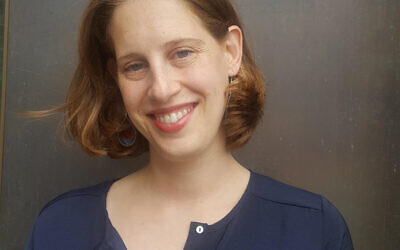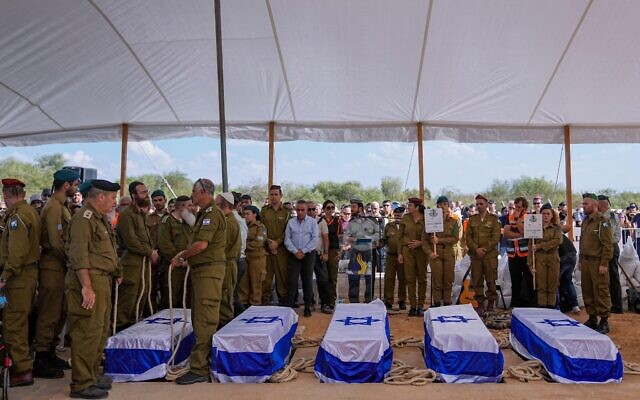OPINION: Our ability to champion difference is a great asset… so why not on Israel?
Theatre director Rachel Grunwald on how recognising the sorrow of the Palestinians does not diminish our own.
War is not external. For me, as for so many others, the past few months have wrought a near-comprehensive collapse of internal peace. For me the turmoil is compounded by fear around what I can and cannot say among my friends, my loved ones, my community, about Israel. A fear I experience now, as I write.
I adore being Jewish in the UK. I treasure our community, culture and practice. The quality I love most is the diversity. Such richness and flex. So much space opened up for change and counter-change. You want to worship a certain way? Go here. You believe something a bit different but want to worship that way too? Go there. You sort of want to do it that way but you don’t think women should be doing that – start a new thing over there. You don’t like that new thing or any of the others? Over there. We’ll see you at kiddush.
Our ability to hold and champion difference and disagreement is our most valuable quality. I don’t know that any other religious community in the UK has re-formed itself over and over into such a biodiverse ecosystem. It’s a superpower.
And yet, there is one issue on which we brook significantly less plurality of thought. One issue where the majority of institutions, schools and movements speak with one voice. About which people I know and know of have kept silent out of fear for their positions, livelihood, or social repercussions. I’m speaking of course, about Israel.

For years as a communal professional, I held myself back from expressing opinions or asking questions on this topic, and on this topic alone, out of fear for my reputation and that of the organisations I worked for.
Why? I think we’ve collapsed a valuable conceptual space for questioning and learning, and that there are complex issues of idealism, loyalty and betrayal at play. Let me try to open the space.
Running through Judaism, like a golden thread, is the quest to make a better world. We yearn for Jerusalem, and everything that symbolises. The yearning has lasted thousands of years, will last for many thousands more, and transcends time and place.
The Jerusalem of the psalms is an ideal we carry in our hearts, and strive to build. To falter from this is indeed a betrayal of the driving Jewish belief that every day of every year, symbolised by Yom Kippur, we have the power to make ourselves and our world incrementally better.
I fear that we have come to conflate this with present-day Jerusalem, the here-and-now structures of state and politics and army, to the degree that it becomes a point of faith to defend Jerusalem and line up behind Israel’s actions. To the degree that it is commonplace to say, ‘Israel’s not perfect but…’, and then to use that ‘but’ as a stopping point, and desist from any further interrogation of imperfection as soon as the words have been said.
What would happen if we separated these out? Jerusalem the Golden, the utopian, from Jerusalem of the here-and-now. What would happen if we acknowledged that one can yearn for Jerusalem whilst asking – out loud – very difficult questions about Israel?
If we did that, we would open a new space. A conceptual gap. A space for the admittance of doubt. A space for questions. And maybe, for new stories. This is the space playwright Tony Kushner referred to as ‘a bright room called day’.
This is far from easy. Pain and fear, those familiar shadows of the Jewish experience, conspire in us all to close space for questions, doubt and new stories. And others have spoken, better than I can, about the effect of the horrors of 7 October on their ability to feel anything other than their own – our own – pain.
For Holocaust Memorial Day this year I wrote in The Times of our community’s collective pain, trauma and sorrow. I wrote of the readiness to flee or hide that is programmed deep into our psyche. How this has passed from generation to generation, undiminished. The reactions to that piece were extraordinarily powerful.
Readers felt their trauma had been recognised. They felt that their pain had been ‘seen’. The strength of the release, the relief at feeling ‘seen’ perhaps masked a challenge in that text. I wrote that there was no hierarchy in suffering: ‘No use in being the top corpse on the pile’. I ask you now to consider that again. My friends, my loved ones, my community, there is no competition in horror. All of humanity is losing.
As a very young child my father taught me to spill a drop of wine for the fallen Egyptians whilst reciting the ten plagues on Seder night. I used my little finger to shake it onto the tablecloth, the exact opposite of what I spent most of the evening trying to do. Don’t lick it, I was told.
The rest of the sweetness is for us. This is for the memory of those who suffered, even though they were enemies standing in the way of our freedom.
After so many years of holding our own pain so close, so many years of fearing or believing that nobody cares and that therefore we have to hold tighter and closer, we’ve forgotten that we have space in our lives for the pain of others. But we do. It’s there. In the Seder. In the formative story of our people.
Sorrow is like light. It is not diminished by sharing. Allowing in another’s sorrow does not diminish our own. Recognising the pain, trauma and sorrow of the other is the only way to understand and heal. For too long, we have held our own sorrow too close to see anybody else’s.
We’ve looked away, and we have not taught our children the full story. We have not taught our children – or allowed ourselves to learn – that for multitudes of Palestinians their experience of dispossession in 1948 was a ‘nakba’. Catastrophe. I want to teach this to my children without fear that they – or I – will be accused of betrayal if they broach it outside the house.
I hunger for the space to discuss this, in the community I adore.
Discussing this, learning about this, even acknowledging this is not betrayal. It does not cross a rubicon, it does not mean you need to change your politics, your opinions, your support for the existence and safety of a Jewish state. It means you understand that at our wedding, somebody’s else’s glass smashed. And that the past 75 years have cast a shadow of grief and pain as real as our own. That the people who feel that pain will cling to it unless the story changes beyond all recognition.
And we can not change that story unless we talk about it. Unless we make space.
The Kotske Rebbe taught that there is nothing so whole as a broken heart. My friends, my loved ones, my community, we lose nothing by becoming more whole. We can acknowledge the pain of others wholeheartedly. We can acknowledge that whilst we dream of Jerusalem – of a better world, a healed world, a peaceful world – the Jerusalem in our present time and space is far from utopian.
We can make space in our community for diversity of thought and speech about Israel, and allow in all the richness, the questions, the argument and the doubt that characterise our approach to all other aspects of Jewish life.
That would, truly, bring us back to the best of ourselves. We wouldn’t lose a thing. Let’s try.
Rachel Grunwald is a theatre director and cultural leader. Previous roles include Director of Programming at JW3 and Director of Development at The Hampstead Synagogue. She is a member and volunteer at New North London Synagogue.

Thank you for helping to make Jewish News the leading source of news and opinion for the UK Jewish community. Today we're asking for your invaluable help to continue putting our community first in everything we do.
For as little as £5 a month you can help sustain the vital work we do in celebrating and standing up for Jewish life in Britain.
Jewish News holds our community together and keeps us connected. Like a synagogue, it’s where people turn to feel part of something bigger. It also proudly shows the rest of Britain the vibrancy and rich culture of modern Jewish life.
You can make a quick and easy one-off or monthly contribution of £5, £10, £20 or any other sum you’re comfortable with.
100% of your donation will help us continue celebrating our community, in all its dynamic diversity...
Engaging
Being a community platform means so much more than producing a newspaper and website. One of our proudest roles is media partnering with our invaluable charities to amplify the outstanding work they do to help us all.
Celebrating
There’s no shortage of oys in the world but Jewish News takes every opportunity to celebrate the joys too, through projects like Night of Heroes, 40 Under 40 and other compelling countdowns that make the community kvell with pride.
Pioneering
In the first collaboration between media outlets from different faiths, Jewish News worked with British Muslim TV and Church Times to produce a list of young activists leading the way on interfaith understanding.
Campaigning
Royal Mail issued a stamp honouring Holocaust hero Sir Nicholas Winton after a Jewish News campaign attracted more than 100,000 backers. Jewish Newsalso produces special editions of the paper highlighting pressing issues including mental health and Holocaust remembrance.
Easy access
In an age when news is readily accessible, Jewish News provides high-quality content free online and offline, removing any financial barriers to connecting people.
Voice of our community to wider society
The Jewish News team regularly appears on TV, radio and on the pages of the national press to comment on stories about the Jewish community. Easy access to the paper on the streets of London also means Jewish News provides an invaluable window into the community for the country at large.
We hope you agree all this is worth preserving.






















